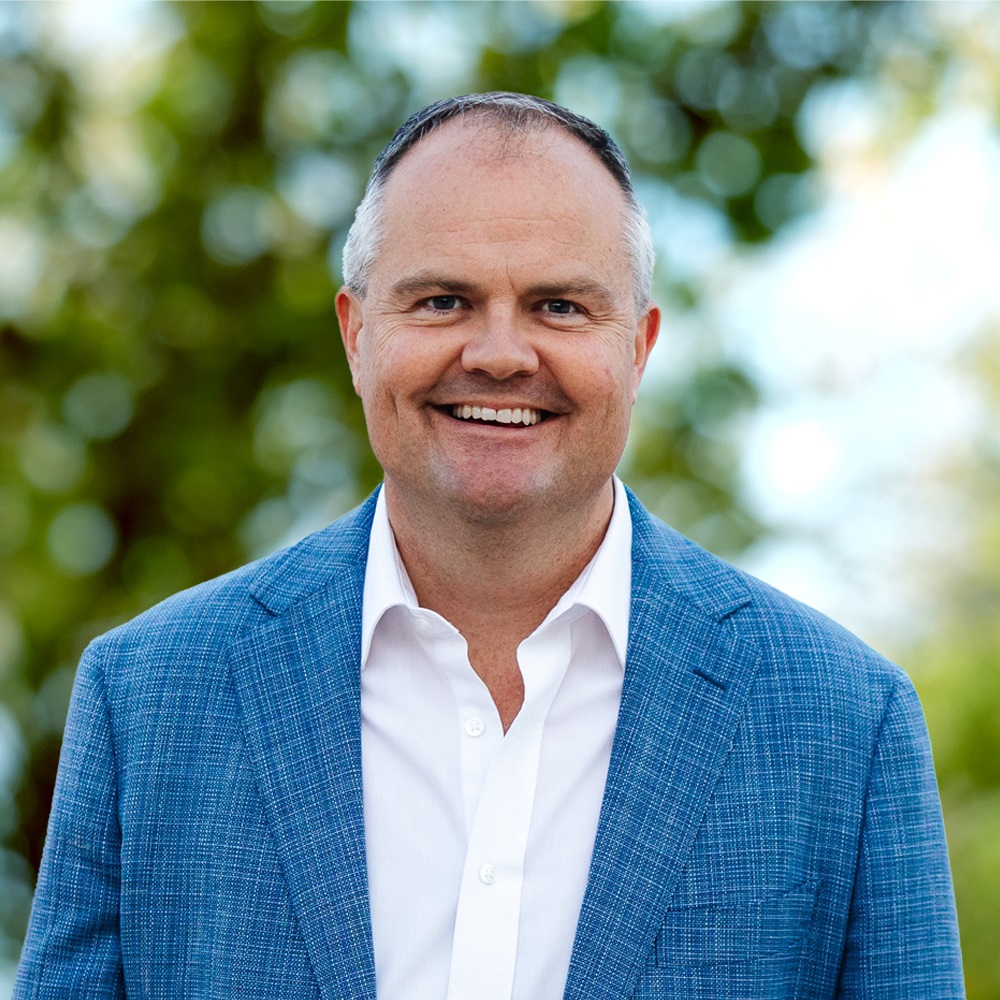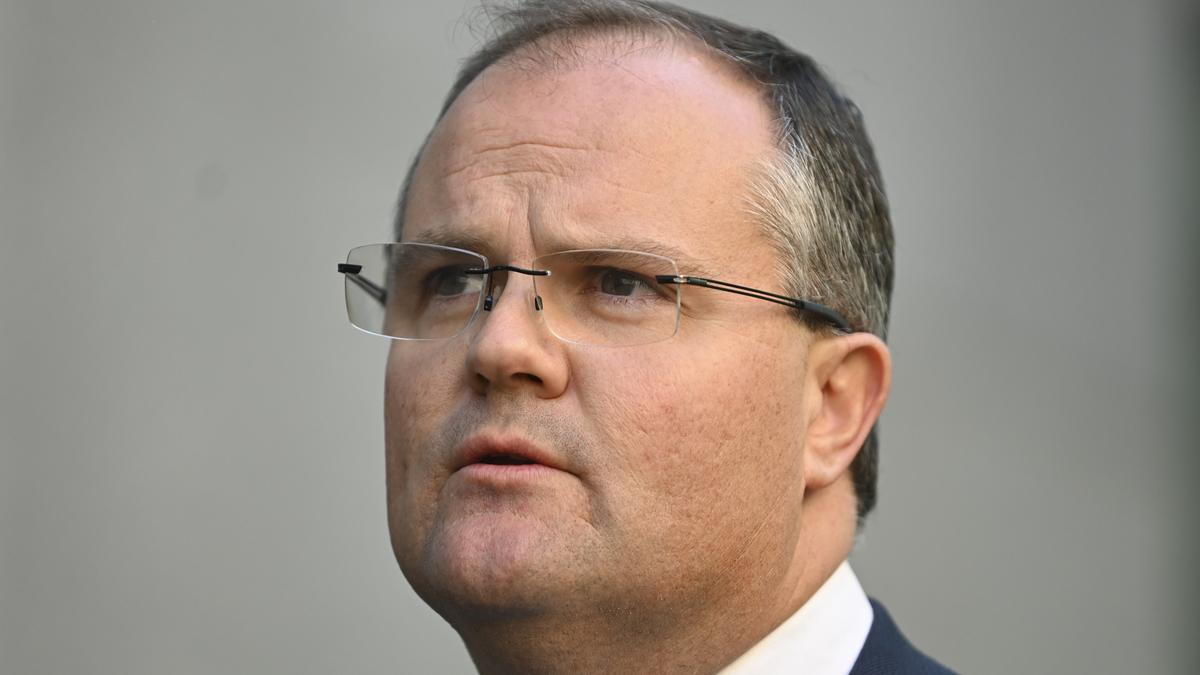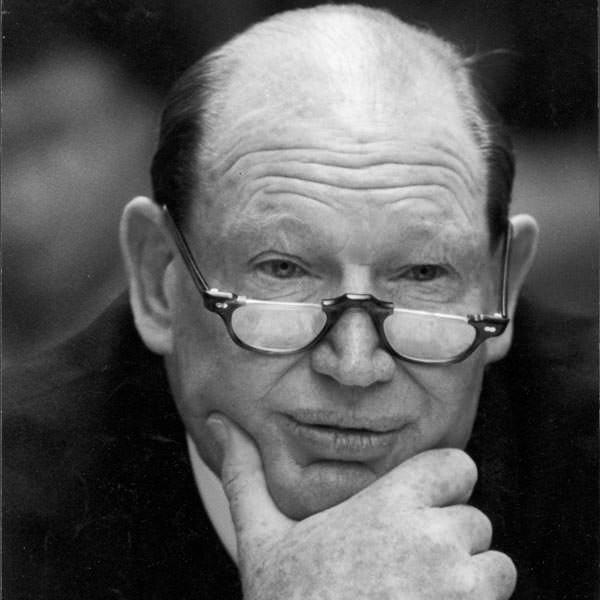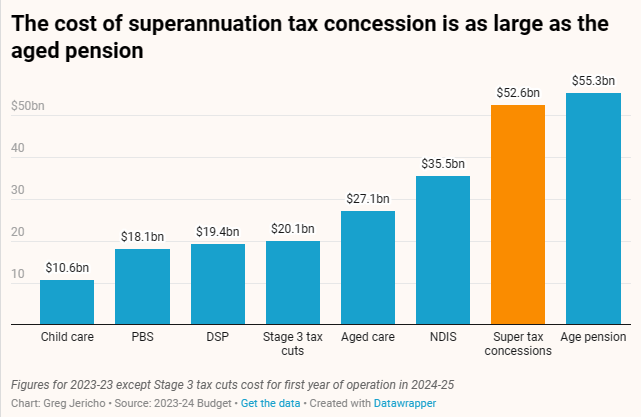Big Ted O’Brien makes a goose of himself

Today we meet Ted. Almost nobody knows who Ted is. Ted is your shadow Treasurer.
Now, those nutters at the AFR have an issue with ALP governments, and particularly with the proposed changes to superannuation affecting about 80 thousand Australians with super balances of more than $3 million. They have seen fit to get Ted to spout forth on Superannuation and Ted is about as senior as the Libs run these days.
The Liberals do need to restore credibility, and at a certain level it all makes sense. Ted is the guy you would want. However, you would be wanting him to say something of substance. And Ted’s version of substance bodes ominously for (in no particular order) people like Ted, the electorate, and the Liberal Party.
Now at that point, a glimpse at who Ted actually is becomes worthwhile.
He is a scion of a family of flour mill owners, was a consultant with Accenture for ten years, has an MBA from Melbourne University, and an Economics Masters from LSE, to go with an Arts degree from QLD, rounding out St Joseph’s Nudgee College in Brisbane’s Northern suburbs. He speaks Chinese and has qualifications from Taiwan, and has worked out of China, before returning to Australia and lobbying, then setting up his own lobbying firm.
At that point we could make the point that Ted has some inherited wealth about the house, his parents have indulged in his educational whims without future HECS debts being a concern, and he has spent a chunk of his working life consulting after asking fee payers what outcomes they wanted.
He has returned to Australia to whisper silken words into decision-making ears prior to entering politics and having silken words whispered into his.
Before we get to his piece, we can safely assume that Ted has a point of view distinct from the concerns of about 99% of the electorate and will have a point of view that is malleable in exchange for silken words or cash. We can plausibly assume that some entity in the superannuation world has a pecuniary interest in what Ted says here.
To round him out, his pictures tell us he may have gone to the same sincerity coach as Scott Morrison.

Ted does good ScoMo impersonations
Let’s begin with the following salvo from Ted:
Labor’s ‘eat the rich’ super tax will swallow young people’s hopes
Jim Chalmers is pretending to be a modern-day Robin Hood taking from old fat cats. In truth, Labor’s super tax will see younger Australians eaten by their own government.
Ted O’Brien Shadow Minister
Jun 26, 2025 – 6.32pm
“Eat the rich” may be the guiding principle of Labor’s new superannuation tax, but aspirational young Australians will be gobbled up instead.
At first blush, Labor’s new super tax reflects the politics of class conflict in the spirit of French philosopher Jean-Jacques Rousseau, whose phrase “eat the rich” warned that the poor may take the heads of the rich who build wealth at their expense.
But this is just clever framing by Jim Chalmers, who wants to be seen as a modern-day Robin Hood taking money from old fat cats with multi-million-dollar portfolios to fund the good deeds of government.
However, nothing could be further from the truth.
The ALP’s proposed superannuation changes involve balances of more than $3 million. Ted looks past the idea that, as far as 99% of Australians are concerned, he is rich. Those persons with super balances of more than $3 million would have far more in common with Ted than Ted has with us.
Ted is lecturing us about the treatment of people with more than $3 million in their super balances. If Ted isn’t lecturing us about his vested interest, he will only be a phone call away from it. Thanks Ted.
A glimpse at recent data tells us that the median full-time income in Australia is about $90 thousand per year. From there we can deduce that the $3 million entrance point for being affected by the governments proposed changes represented about 18 years of working and getting the median full-time income, and ploughing the whole box and dice into superannuation, and getting 7% accumulation on that whole box and dice. That’s 18 years, Ted.
Ted may not be all that shocked to discover that almost no Australians will be in a position to plough the whole box and dice of the fruits of their labours into superannuation for 18 years. Some people pay for kids or spouses, very large numbers of people pay off exceptionally large (in a global context) mortgages, some pay for parents, and some people live life, buy new clothes, travel, indulge in cultural or sporting pursuits. Some people eat.
Now at that point, we may observe that there certainly are people in the electorate wondering why the proposed changes to superannuation cut in at such a high rate. They are thinking that ploughing the median annual salary would still take 14 years to get to 2 million.
And if we bring the electorate another step from there, we could observe that if we are going to eat the rich, there is probably lower-hanging rich to consume.
From there comes the proposition that if the ALP does want to eat the rich, they aren’t being very serious about it.
That’s before thinking that the man telling them the ALP wants to eat the rich almost certainly is rich. That wealth of education Ted has soaked up hasn’t been wasted if he can flip a Rousseau reference (going miles over the head of most of the electorate) but Ted the politician probably won’t get much traction in 2025 Australia with Rousseau.

He betrays his inner thinking by noting that if an electorate had an appetite for good deeds by government and was strapped for cash in funding these, then soaking the rich would be a plausible idea to follow. That has been the standard modus operandi for Liberal governments over the past 30 years—cream working Australians and give tax offsets to the aspirational affluent.
Now. If working Australians have experienced, say, 21 out of 30 years under Liberal governments waging class warfare against them (and 9 of ALP governments doing not much about it) by creaming them to give to people like Ted, then shackling said rich to extract the requisite pounds of flesh could have a logic, couldn’t it?
Then Ted discovers the hyperspace button.
It is estimated that nearly $155 billion could move out of SMSFs to invest in the housing market due to Labor’s super tax.
It is at this point Ted wedges himself by implying that about half the 80 thousand people with more than $3 million in super (which equals about $240 billion) have it in SMSFs, which could be emptied if the ALP government follows through with taxes for those super balances.
That could in fact be perfectly true, but it brings into question whether the intent of the SMSF is tax avoidance or if it is about what superannuation is intended for, doesn’t it?
And yes it does bring about the question of where the super-affluent might subsequently try and hide that affluence.
From there Ted becomes an intellectual pinball machine, bouncing from brain fart to brain fart without a skerrick of analysis or dressing in the form of rationale.
Labor’s super tax is a blatant tax grab and everyday young Australians will be among those hardest hit.
Ted, is that Australians other than those looking at ploughing entire median full time incomes for 18 years before they have a remote chance of being affected? Would they be ‘hardest hit’ or entirely unaffected?
Ted, if we were to accept that the super tax was a blatant tax grab—and history tells us that nearly all ALP governments have a neoliberal terror of being seen as taxing for socially progressive purposes (see treatment of unemployed)—would working Australians who have been ‘hardest hit’ by political choices regarding everything from
- Tax cuts for the wealthy,
- Negative gearing and capital gains tax concessions,
- Private health rebates
- Private education subsidies
- Covid stimulus measures
- Immigration
- Free Trade agreements
- Energy policy, and through to the
- Bastardisation of Superannuation to the point where it is a ‘wealth management and generational bequest vehicle for the exceptionally affluent rather than the dignity in retirement for working Australians plan it was originally intended as.
Ted, would working Australians assume that a bit of blatant tax grabbing was out of line there? On their behalf?
Ted, and those everyday young Australians who will be amongst those ‘hardest hit,’ would that only be after they had spent 18 years ploughing the equivalent of median full-time incomes into super and getting 7% returns?
Would that mean that if they weren’t planning to plough 18 years worth of median full time incomes into their super they wouldn’t have to worry about it?
Failing to index the $3 million threshold for the new tax will see a substantial portion of average full-time earners in their 20s paying the tax before they retire, according to AMP’s deputy chief economist.
Hey Ted, what proportion of Australians in their 20s actually earn the median full time income? And if they were starting from scratch and didn’t have wealth from Mum and Dad and did spend on living and were paying off a mortgage, how long would it take them to be affected, do you reckon? Is AMP’s Deputy chief economist on psychotropics? Is AMP’s Deputy chief economist assuming Australians in their 20s will work until they are 90?
Then we get the following:
And we know that this is part of Chalmers’ attempt to fund his big spending spree, as Treasury has stated non-indexation will “contribute to the sustainability of the system over time”.
That looks like a man panicking about the idea that someone other than the 1% may be a beneficiary of government spending and, potentially worse depending on your viewpoint, more disturbingly, that a government may soak the 1% to fund spending on someone other than the 1%.
Just so you know, Ted, if ever you get to Treasury, they will be focused on abstract concepts like budget sustainability and will be generally enthusiastic about the idea that someone somewhere will be getting soaked to fund outlays.
It would be true to say they will have no qualms about soaking working Australians to fund offsets and outlays to the 1%, as you would have seen from your time in cabinet, but consistent with the government’s expectations of the public sector, they are attuned to governments prepared to soak the 1% to fund offsets to the 99%.
Next up, Ted brings in the ghost of Kerry Packer.
Applying the Packer principle, self-managed super fund holders will inevitably change their behaviour to minimise exposure to this new tax.
No indexation of Labor’s super tax will punish today’s youth over time, but it is Labor’s decision to tax unrealised capital gains which will hurt young Australians in the short term.
In designing the tax, Labor foolishly assumed people with lots of money in their super accounts will sit idly by as the government comes along and doubles their tax rate and applies it to theoretical gains – or paper profits – on investments.
Remember Kerry Packer’s words at a parliamentary inquiry: “Now of course I am minimising my tax and if anybody in this country doesn’t minimise their tax, they want their heads read, because as a government I can tell you, you’re not spending it that well that we should be donating extra”.
Applying the Packer principle, self-managed super fund (SMSF) holders will inevitably change their behaviour to minimise exposure to this new tax.
Now at this point Ted raises an interesting point. Indexation of the proposed tax makes sense, but if the starting point is so high as to affect only those ploughing 18 years of median full time earnings into super before they are affected, then there is plenty of time before indexing becomes a political necessity. Or affects ordinary people in any way.
Beyond that, Ted has presumably been clean bowled by the idea that if the government gets the ultra-affluent out of the super system, then government can start addressing super as an aged income system and maybe work on delivering benefits for Australians looking at retiring.
Once they are chased out of super a government could presumably work on tax avoidance and intergenerational equality issues with other legislation and policy.
We can only assume the late Kerry Packer would have eaten Ted alive.
 Kerry ate idiots
Kerry ate idiots
Ted comes back with a complete misunderstanding of what ‘Young’ Australia is about.
As a result, young Australians will be hurt.
Firstly, it will be harder for young Australians to start their own business.
New Commonwealth Bank research shows Millennials and Gen Z business owners drive Australian entrepreneurship, accounting for 62 per cent of all new businesses in retail trade openings in the 12 months to March 31.
Many of these start-ups rely on SMSFs. Start-ups typically take years to turn a healthy profit, and about 60 per cent end up failing.
Under Labor’s plan, a SMSF holder investing in a start-up may be required to pay money to the ATO from Year 1 for a venture whose value increases but never delivers a return.
To avoid this unfair tax grab, SMSF holders will invest less in start-ups.

Ted may be interested to know that some members of Generation Z, inter alia, sit in their bedrooms in front of a screen and buy something from someone somewhere at price A, and sell that item to someone somewhere else at Price B.
There is no inherent need to meet anyone anywhere else, and the sold items might be regulated capital instruments but are regularly secondhand shoes or sportswear, or comic books, or NFTs, or whatever.
Like Ted and his 1%ers and their SMSFs, these kids aren’t usually interested in tax or abstract concepts like social goods and budgets. They just want the cash here and now.
Plenty of them create some form of legal entity to help with the tax avoidance, and that is all the new businesses Ted is spouting there. All of them can access taxation write offs for things such as rent, energy, and communications for as long as they exist, which is why working Australians might assume that the system in which they pay PAYE taxes could potentially be rigged against them as well.
Most young people would just like a half decent job which delivers a pay outcome and didnt involve take away food or retail, or wasn’t public funded.
Alas that isn’t contemporary Australia is it Ted, and did governments Ted was part of play a major role in creating that?
Maybe, just maybe, most SMSFs only invest in startups for tax minimisation purposes too. Maybe the shadow Treasurer is seeing more loosening of the shackles on working Australians funded by the 1%.
The numbers of SMSFs invested in any economically productive endeavour outside tax minimisation is infinitesimally small and a fraction of what would be parked in speculative and tax avoiding positions in housing, for example.
Maybe the Liberal Shadow Treasurer is seeing a theme in a government saying it wants to do something about house prices. Who knows?
From there Ted journeys into other businesses and makes no sense there either.
Secondly, fewer job opportunities in high growth companies will exist for young people.
According to the Journal of Financial Economics, young people are also attracted to high-growth companies because they offer greater potential to innovate and higher wages.
For investors, these companies are high risk but offer high returns.
The more capital invested, the more opportunities open for young Australians.
However, by taxing unrealised capital gains, these high-growth companies become less attractive for SMSFs because, like start-ups, taxes will be likely owed before returns come in.
In effect, Labor’s tax will suffocate patient capital from SMSFs and starve aspiring young workers from getting their start in smaller high-growth companies.
Other investors may also be turned off, fearing it is only a matter of time before the government applies its new tax principle beyond superannuation.
Ted has now branched off into ‘high growth’ companies. Would he care to identify a high growth company in Australia offering meaningful high income employment for any significant number of people? Especially seeing as he was part of a government looking after them for of the last 12 years.
Taxing unrealised capital gains is a serious issue with the government’s proposal, but Ted doesn’t address it seriously. He just suggests taxing unrealised gains will make the capital more risk averse, which we know it already is.
The underlying issue which Ted doesn’t want to go anywhere near is the extent to which SMSFs serve any meaningful capital allocation role in the economy against the backdrop of a perception that SMSFs are almost solely about tax avoidance. And if they are almost solely about tax avoidance and not about economic investment, then chasing capital out of SMSFs may have a logic.
Which would bring in the logic of chasing that capital currently in SMSFs out of wherever it goes to after SMSFs if it isnt economically meaningful for the nation.
At that point, Ted identifies the most likely speculative and tax avoiding position much of that capital would go to, indeed where much SMSF capital already occupies. The housing market. What else in Australia is there to invest in?
Raconteurs of bare faced effrontery will be impressed with Ted’s mentioning of home purchase difficulties experienced by the young, if $150 billion currently in SMSFs gets shunted into housing.
Thirdly, it will be harder for young Australians to own their own home.
The great Australian dream of home ownership is already beyond reach for many. Placing a deposit on the average home, for example, took six years in the early 1990s but now takes more than 12.
It is estimated that nearly $155 billion could move out of SMSFs to invest in the housing market due to Labor’s super tax.
If, hypothetically, all this $155 billion went into new home completions at $1 million a home, this reallocation would snap up 155,000 new builds, or nearly 1.5 years of supply.
Prices would increase, crowding out even more young aspiring home buyers.
Suffice it to say that if a Liberal shadow treasurer is holding them to ransom the way Ted—who presumably has never experienced being a crowded out young home buyer—is, then we may never see a Liberal government again. But his underlying point has some substance and we should be asking the ALP if their productivity measures, including chasing non-productive rentier capital out of the housing market, might not be a good idea.
And then, at the end….
Under Sussan Ley’s leadership, we’ve been clear – the Opposition will be constructive where we can and critical where we must. On this one, only criticism is warranted.
Labor’s super tax won’t eat the rich, but eat the young by denying their aspirations in the short term and stealing their savings in the long term.
Well, Sussan likes a bit of property speculation, doesnt she? Though Ted stapling her name to the end of his gibberish may bring questions the next time they meet.
And these guys are the alternative government.